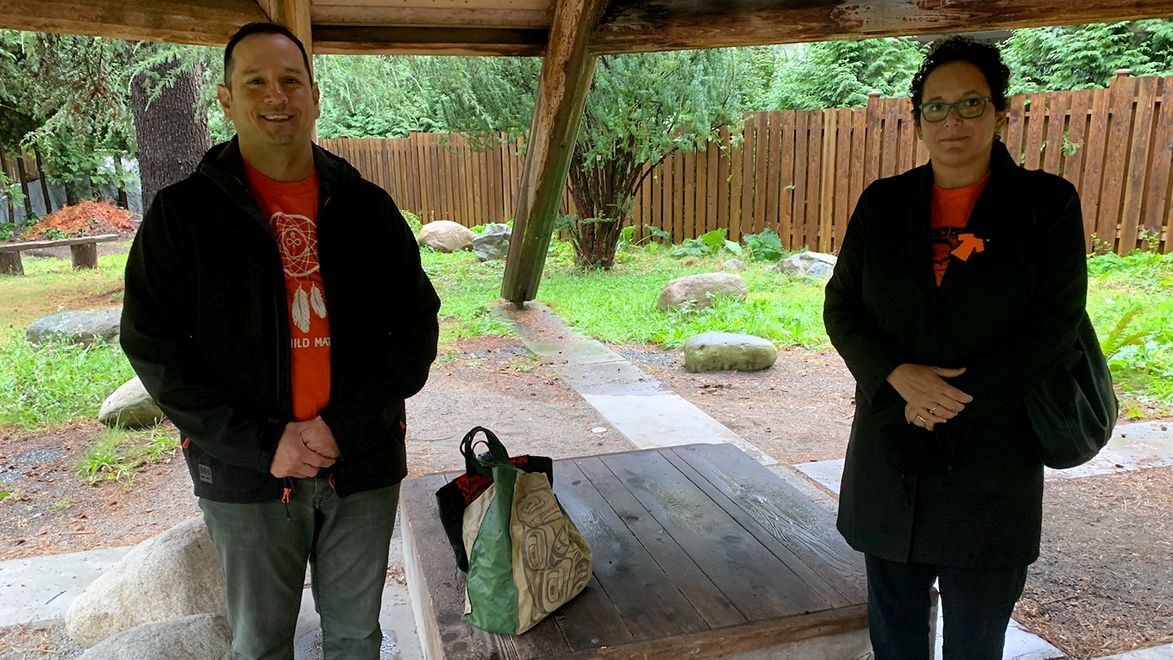Listening, recognizing, remembering: Marking Orange Shirt Day

It may be difficult to imagine the realities of residential schools in our country: children taken from their families, those they loved, the places they knew and the culture they should have been able to embrace through their childhoods. Many died in the schools, and others left permanently scarred. The impact of that reality for millions of Indigenous families did not go away with the closure of the last school in 1996. The policy at the time to “kill the Indian, save the child” directly affects current generations of Indigenous people, through lost language, identity and connections to relations. School communities across the Vancouver School District mark Orange Shirt Day (September 30), a day to reflect and to look forward.
Chas Desjarlais, district principal of Indigenous Education’s own grandmother came from a family of nine children in Cold Lake, Alberta, and she was placed in the Onion Lake Indian Residential School on the Alberta/Saskatchewan border. Desjarlais’ grandmother never spoke of her time there to her granddaughter – and Desjarlais did not know she had attended the school until after her grandmother passed away. “She did share her story to the Truth and Reconciliation Commission so I imagine there was some suffering that she experienced there – she probably didn’t share that with any of the family,” Desjarlais says.
Desjarlais points out some people are even closer generationally to the experience, with parents having attended residential schools.
“It does impact, socially, emotionally, spiritually, physically, and there is a great sense of loss, but I think you know, we are a strong people. Indigenous people have always ‘surthrived’ and been resilient, but it’s a history that can’t be forgotten and it’s a history that all Canadians have to reconcile with,” she says.
Her message to students is they have a responsibility to remember and recognize that Indigenous peoples are reconciling with that history of loss. “I hope that students and families are aware they too are connected to that history because their ancestors were here alongside my ancestors at the same time,” she says. “And although they may not have been aware or knew what was going on at those schools, we have a responsibility to know the truth, and it’s the truth that is crucial – the real truth, the history – and history hasn’t always been told from the right people to tell this history.”
Chad Carpenter, Indigenous education worker at the Vancouver School District has also experienced intergenerational trauma directly linked to residential schools. Carpenter’s grandfather was sexually abused while in a residential school, behaviours then perpetuated with the next generation. Carpenter’s mother brought her children to Vancouver from Prince George to escape her father, and she self-medicated with drugs and alcohol. Carpenter and his brothers were in and out of foster care until he became a permanent ward of the court when he was eight. He says foster homes were like another kind of residential school where there was no attempt to connect him with his roots. Throughout his childhood, he did his best to hide the fact he was Indigenous, saying he simultaneously felt shame about his heritage and shame for not knowing much about that heritage. Only when he was around 20 years old did he begin exploring his culture, learn what residential schools were, and the root of the turmoil within his own family. “There was a lot of perpetuation of physical, emotional, spiritual abuse on me from when I lived with my mother and when I lived with foster homes,” Carpenter explains. “And from that, we could say I gained a lot of life experience the hard way, and that’s in retrospect – that’s how I use my experience as a catalyst now…That life experience allows me to be very empathic, efficient in working with Indigenous youth, children and their families.”
In the last 10 years, he attempted to connect with his former community in Prince George. “And within that place of origin, my family, my community, my territory, the teachings that I never received, the ceremony that I never received, the culture that I never received. And when you don’t have those things like your family – and this relates to the residential school experiences – when you’re taken away from your family and all those things, all those building blocks that make you who you are and that are really a part of you, that need to be a part of you – I went through life not knowing how to manage, not knowing how to thrive. I couldn’t thrive because I was so stuck in the trauma and I didn’t have any teachings to kind of fall back onto.” He says the connection he feels exploring his culture is profound and adds talking to elders calms his whole being.
Of Orange Shirt Day, Carpenter says, “It’s not just a day, it’s an opportunity to really have people from all walks of life, no matter what profession, what race, it doesn’t matter where you come from, you have an opportunity to either enhance your knowledge or become curious.”
Given students cannot gather in large groups due to the pandemic, Desjarlais and Carpenter told their stories in a video filmed and edited by Matthew Thiessen, drama teacher at Lord Byng Secondary. The video is being shared with administrators throughout the District to be shown to students in recognition of and teaching about Orange Shirt Day.
